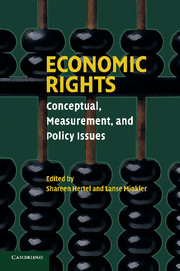Book contents
- Frontmatter
- Contents
- Contributors
- Acknowledgments
- 1 Economic Rights: The Terrain
- SECTION I CONCEPTS
- SECTION II MEASUREMENT
- SECTION III POLICY ISSUES
- 12 Economic Rights and Extraterritorial Obligations
- 13 International Obligations for Economic and Social Rights: The Case of the Millennium Development Goal Eight
- 14 The United States and International Economic Rights: Law, Social Reality, and Political Choice
- 15 Public Policy and Economic Rights in Ghana and Uganda
- 16 Human Rights as Instruments of Emancipation and Economic Development
- 17 Worker Rights and Economic Development: The Cases of Occupational Safety and Health and Child Labor
- APPENDIX 1 Universal Declaration of Human Rights
- APPENDIX 2 International Covenant on Economic, Social, and Cultural Rights
- Index
- References
14 - The United States and International Economic Rights: Law, Social Reality, and Political Choice
Published online by Cambridge University Press: 18 December 2009
- Frontmatter
- Contents
- Contributors
- Acknowledgments
- 1 Economic Rights: The Terrain
- SECTION I CONCEPTS
- SECTION II MEASUREMENT
- SECTION III POLICY ISSUES
- 12 Economic Rights and Extraterritorial Obligations
- 13 International Obligations for Economic and Social Rights: The Case of the Millennium Development Goal Eight
- 14 The United States and International Economic Rights: Law, Social Reality, and Political Choice
- 15 Public Policy and Economic Rights in Ghana and Uganda
- 16 Human Rights as Instruments of Emancipation and Economic Development
- 17 Worker Rights and Economic Development: The Cases of Occupational Safety and Health and Child Labor
- APPENDIX 1 Universal Declaration of Human Rights
- APPENDIX 2 International Covenant on Economic, Social, and Cultural Rights
- Index
- References
Summary
It is well known that whereas the international law of human rights recognizes personal and transcendent entitlements to work and adequate food, clothing, shelter, and health care, the United States does not. Naturally I refer primarily to the International Covenant on Economic, Social, and Cultural Rights (ICESCR), and the lack of U.S. ratification (see Felice 2003). It is also well known that although Democratic presidents such as Franklin D. Roosevelt (FDR) and Harry S. Truman were genuinely interested in welfare rights, which comprise a subset of broader economic rights, with time the general subject faded in American public life. Presidents no longer talk about a second bill of rights to expand on civil and political rights, or propose schemes of national health insurance (at least not at the time of writing). Many human rights advocates bemoan this state of affairs. This paper inquires as to whether the situation is as dire as the Cassandras would have us believe.
I first give some historical background, drawing a distinction between fundamental rights and fundamental policies. It is worth recalling that even FDR used the language of “a second bill of rights” as a metaphor for fundamental social policies. He never proposed formal changes to the U.S. Constitution regarding social rights. When he spoke of social or welfare rights, he meant the statutory rights that are embedded in formal policies, not constitutional rights or amendments. (Treaty provisions on social rights did not exist during his era.
- Type
- Chapter
- Information
- Economic RightsConceptual, Measurement, and Policy Issues, pp. 310 - 324Publisher: Cambridge University PressPrint publication year: 2007
References
- 1
- Cited by

